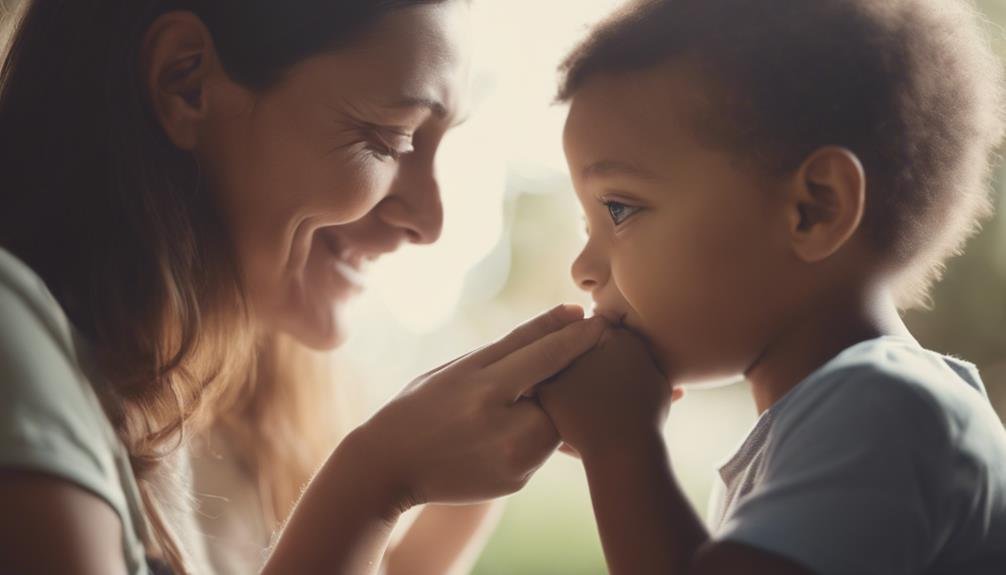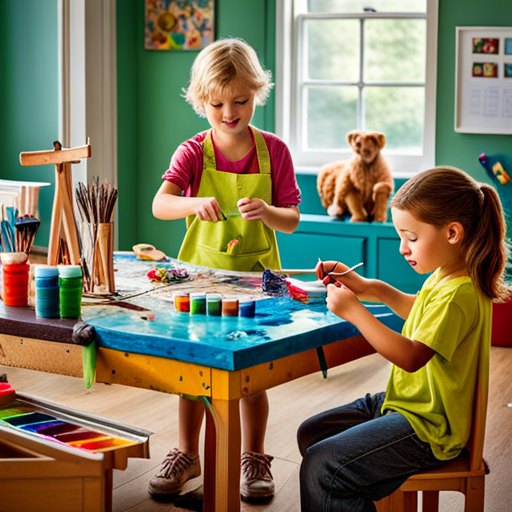How to Encourage Empathy and Kindness in Young Children
Encouraging empathy and kindness in young children can sometimes seem like a challenging task in a world where self-centeredness and indifference are prevalent.
However, by incorporating simple yet effective strategies into everyday interactions, you can create a nurturing environment that fosters these essential qualities in your child.
From leading by example to exploring creative ways of instilling empathy, each step plays a vital role in shaping your child's character.
But how exactly can you cultivate these virtues in your little one?
Key Takeaways
- Promote empathy through modeling compassionate behavior and active listening.
- Use compassionate language and creative activities to teach empathy effectively.
- Engage in kindness projects together to nurture empathy and strengthen bonds.
- Encourage perspective-taking, emotional expression, and open discussions to foster empathy in children.
Importance of Empathy in Children

Understanding the importance of empathy in children is essential for fostering a compassionate and understanding future generation. Empathy development plays a pivotal role in shaping a child's social and emotional intelligence. By instilling empathy early on, children learn to recognize and understand emotions in themselves and others, leading to more meaningful and authentic connections. Kindness education goes hand in hand with empathy as children who are empathetic are more likely to demonstrate acts of kindness towards others. Encouraging empathy in young children involves teaching them to contemplate different perspectives, actively listen to others, and practice compassion.
Empathy development not only enhances interpersonal relationships but also cultivates a sense of community and belonging. Through kindness education, children learn the value of treating others with respect and empathy, fostering a more inclusive and harmonious environment. By emphasizing empathy and kindness in children, we lay the foundation for a future generation that values understanding, compassion, and cooperation.
Modeling Empathy as Adults
To foster empathy in young children, adults can model compassionate behavior in their interactions and daily lives. Role modeling is a critical tool in shaping a child's understanding of empathy. When children see adults displaying kindness, understanding, and empathy in various situations, they're more likely to emulate these behaviors themselves. By practicing active listening, showing empathy towards others, and engaging in acts of kindness, adults demonstrate the importance of empathy in relationships.
Moreover, emotional regulation plays an essential role in modeling empathy. By managing your own emotions effectively, you show children how to navigate challenging situations with compassion and understanding. When children witness adults handling stress, anger, or frustration in a calm and empathetic manner, they learn valuable lessons in emotional regulation and empathy.
Teaching Through Compassionate Language

Modeling empathy as adults sets a powerful example for young children, and one effective way to further instill this value is through teaching using compassionate language. By incorporating compassionate language in your interactions with children, you can help them understand the importance of empathy and kindness towards others. Role playing scenarios and encouraging creative expression are excellent methods to teach children about empathy through compassionate language.
| Role Playing Scenarios | Creative Expression |
|---|---|
| Act out different situations where empathy is needed. | Encourage drawing, storytelling, or acting out scenarios that promote empathy. |
| Switch roles to understand different perspectives. | Use art, music, or drama to express emotions and empathize with others. |
| Discuss feelings and reactions in various scenarios. | Create a safe space for children to express their emotions and practice empathy. |
Engaging in Acts of Kindness Together
Engage in acts of kindness together to strengthen bonds and nurture empathy in young children. Kindness projects and empathy activities provide opportunities for children to experience the joy of giving and the impact of their actions on others. Community service not only instills a sense of responsibility towards the community but also fosters empathy by exposing children to different needs and perspectives.
Kindness crafts can be a fun way to engage children in acts of kindness. Create simple crafts like kindness rocks to be placed in the community for strangers to find or handmade cards for nursing home residents. By working together on these projects, children learn the value of spreading kindness and the importance of connecting with others on an emotional level.
Engaging in acts of kindness together not only teaches children the significance of empathy but also strengthens the bonds within families and communities. These shared experiences create lasting memories and instill values of compassion and kindness that children will carry with them into adulthood.
Encouraging Perspective-Taking Exercises

Think about stepping into others' shoes through perspective-taking exercises to foster empathy and understanding in young children. Role playing scenarios and creative storytelling are powerful tools to help children see the world from different viewpoints.
Here are some effective ways to encourage perspective-taking exercises:
- Role playing scenarios: Engage children in acting out various roles to experience different perspectives firsthand.
- Creative storytelling: Share stories that highlight diverse experiences and emotions, prompting children to empathize with the characters.
- Encourage discussions: After a role play or story, ask open-ended questions to encourage children to reflect on how others may feel in similar situations.
- Lead by example: Demonstrate empathy in your own interactions, showing children how to think about others' feelings and perspectives.
Discussing Feelings and Emotions Openly
Encouraging open discussions about feelings and emotions can greatly enhance young children's emotional intelligence and empathy towards others. By fostering a safe space for children to express their emotions openly, you are nurturing their ability to recognize and understand their own feelings as well as those of others. This open communication and feelings exploration play a pivotal role in empathy building, teaching children to connect with others on a deeper level.
| Benefits of Discussing Feelings Openly | Effects on Children | Tips for Open Communication |
|---|---|---|
| Enhances emotional intelligence | Develops empathy | Listen actively without judgment |
| Promotes self-awareness | Encourages compassion | Encourage children to label their emotions |
| Strengthens interpersonal relationships | Fosters understanding | Share your own feelings as a role model |
Reading and Watching Stories of Empathy

Exploring stories that showcase empathy through reading and watching can profoundly impact young children's understanding of compassion and connection with others. When children engage with narratives that highlight empathy, they develop a deeper emotional intelligence and a heightened sense of empathy towards those around them.
Here are some ways storytelling and media influence can nurture empathy development:
- Fostering Perspective-Taking: Stories allow children to step into the shoes of characters, experiencing different viewpoints and emotions, which enhances their ability to understand others' feelings.
- Encouraging Emotional Expression: By witnessing characters express empathy in stories, children learn that emotions are valid and can be shared openly and compassionately.
- Building Empathy Skills: Through observing how characters respond empathetically to challenges, children can learn practical ways to show kindness and support to others.
- Inspiring Empathetic Actions: Stories of empathy can motivate children to translate what they've learned into real-life actions, fostering a culture of kindness and understanding in their interactions.
Through curated storytelling experiences, children can develop essential skills that shape them into empathetic individuals capable of creating meaningful connections with others.
Setting Boundaries With Empathy in Mind
As young children immerse themselves in stories of empathy, it is important to understand how to set boundaries with empathy in mind to cultivate healthy and respectful relationships. When setting boundaries for young ones, it's critical to do so with consistent reinforcement and clear communication. By approaching boundaries empathetically, you can teach children the importance of respecting others' feelings and personal space while also expressing their own needs and emotions. Here is a helpful table outlining key points to think about when setting boundaries with empathy:
| Setting Boundaries with Empathy | Key Points |
|---|---|
| Consistent Reinforcement | Reinforce boundaries consistently to establish clear expectations. |
| Clear Communication | Clearly communicate the reasons behind the boundaries to foster understanding. |
| Respect for Feelings | Encourage empathy towards others' emotions when setting and respecting boundaries. |
| Encouraging Expression | Create a safe space for children to express their feelings and needs within boundaries. |
| Flexibility and Understanding | Be open to discussions and adjustments while maintaining the core boundaries. |
Practicing Gratitude and Appreciation

To instill a sense of gratitude and appreciation in young children, it's vital to incorporate daily practices that foster mindful reflection and recognition of the positive aspects in their lives. Encouraging children to pause and appreciate the good things around them can have a profound impact on their overall well-being and empathy towards others.
Here are some effective strategies to cultivate gratitude and appreciation in young minds:
- Mindful reflection: Teach children to take a moment each day to reflect on things they're grateful for, encouraging them to focus on simple pleasures and meaningful experiences.
- Gratitude journaling: Encourage children to keep a gratitude journal where they can write or draw things they appreciate, helping them develop a habit of recognizing and acknowledging the positive aspects of their lives.
- Expressing gratitude: Encourage children to express their gratitude verbally or through small acts of kindness, fostering a culture of appreciation and empathy towards others.
- Modeling gratitude: Be a positive role model by demonstrating gratitude in your own life, showing children the importance of acknowledging and valuing the good things around them.
Reflecting on Empathy Growth Journeys
Embarking on empathy development journeys can lead young minds to deeper understandings of compassion and connection with others. As children navigate through various empathy milestones, they learn the value of kindness and the impact of their actions on those around them. Fostering compassion and understanding in children is a journey that requires patience and guidance. By reflecting on their experiences and interactions, children can develop a greater sense of empathy towards others.
| Empathy Milestones | Description |
|---|---|
| Recognizing Emotions | Identifying feelings in oneself and others |
| Perspective Taking | Understanding different viewpoints and feelings |
| Showing Empathy | Demonstrating care and concern for others |
Encouraging children to reflect on their empathy development can help reinforce positive behaviors and attitudes. By acknowledging their progress and celebrating small victories, children are motivated to continue on their journey towards becoming kind and empathetic individuals. Remember, every step taken towards understanding and compassion is a significant achievement in nurturing empathetic young hearts.
Frequently Asked Questions
How Can Technology and Screen Time Affect a Child's Development of Empathy and Kindness?
When you rely heavily on technology and screen time, your child's social skills may suffer. Excessive screen time can hinder emotional development, making it harder for them to understand others' feelings and show empathy and kindness.
Are There Any Specific Cultural Considerations to Keep in Mind When Teaching Empathy to Young Children?
To understand cultural sensitivity when teaching young ones empathy, consider diverse perspectives and values. Encouraging emotional intelligence tailored to their background fosters deeper connections. Engage openly, nurturing kindness with a rich tapestry of understanding.
How Can Parents Address and Prevent Bullying Behavior in Their Children Through Empathy-Building Techniques?
To address and prevent bullying behavior in your children, engage in role-playing scenarios and teach emotional intelligence. Encouraging empathy helps them understand others' feelings, fostering kindness. By modeling compassion and discussing emotions, you cultivate a caring environment.
Can Teaching Empathy to Young Children Have a Positive Impact on Their Academic Performance and Social Relationships?
Incorporating emotional intelligence into your child's learning journey can enhance both academic success and peer relationships. By fostering empathy at a young age, you're nurturing a foundation for positive social interactions and overall growth.
What Are Some Strategies for Helping Children Understand and Empathize With People Who Have Different Abilities or Disabilities?
To foster empathy towards those with different abilities or disabilities, consider inclusive education practices. Encourage sensory awareness and disability awareness. Foster social inclusion by teaching the value of diversity and understanding the unique experiences of others.
Conclusion
As you guide young hearts towards empathy and kindness, remember that you're planting seeds of compassion that will bloom into beautiful gardens of understanding and love.
With each act of kindness, each word of empathy, you're nurturing the growth of strong, empathetic souls who'll spread warmth and light wherever they go.
Keep tending to these precious seeds, and watch as they blossom into a world filled with kindness and connection.








